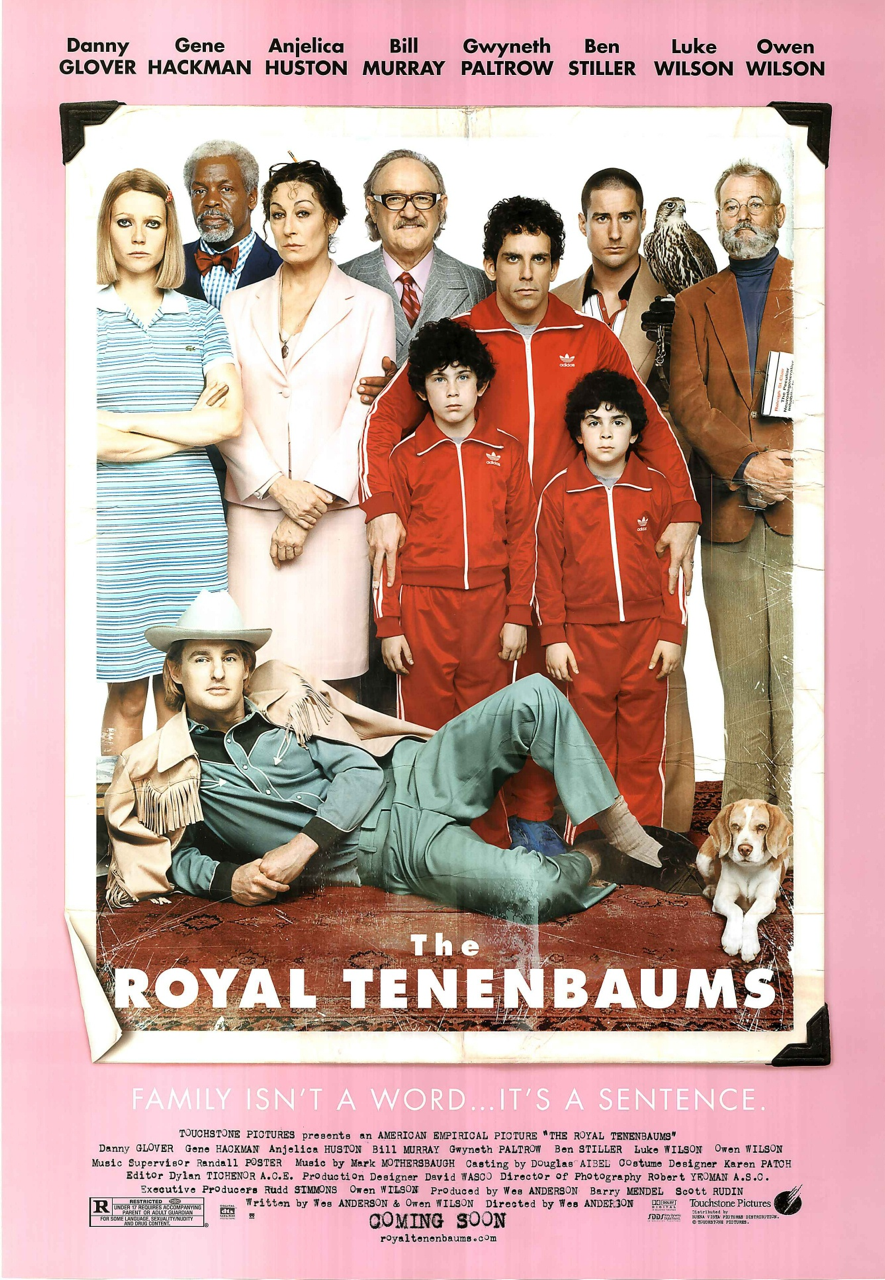The Royal Tenenbaums is not just a film; it is an intricate tapestry woven from the threads of family dynamics, individuality, and the bittersweet nature of life. Released in 2001, this Wes Anderson classic has continued to garner attention and admiration for its unique storytelling style, eccentric characters, and a visually stunning aesthetic that is unmistakably Anderson. In this article, we will explore the film's themes, characters, and its impact on cinema, all while adhering to the principles of expertise, authority, and trustworthiness.
The film chronicles the lives of the Tenenbaum family, each member a prodigy in their own right, yet deeply flawed and struggling with their past. From the estranged father, Royal Tenenbaum, to his three exceptionally gifted children, the narrative unfolds in a manner that is both comedic and poignant. As we delve deeper into the film's elements, we will uncover the layers of meaning that have captivated audiences for over two decades.
Join us as we embark on this journey to understand what makes The Royal Tenenbaums a seminal work in the realm of independent cinema and a defining piece in Wes Anderson's illustrious career.
Table of Contents
- 1. Overview of The Royal Tenenbaums
- 2. Character Analysis
- 3. Themes and Motifs
- 4. Cinematic Techniques
- 5. Reception and Legacy
- 6. Soundtrack and Score
- 7. The Impact on Wes Anderson's Career
- 8. Conclusion
1. Overview of The Royal Tenenbaums
Released in 2001, The Royal Tenenbaums showcases Wes Anderson's distinctive style and storytelling prowess. The film follows the dysfunctional Tenenbaum family and their complex relationships, marked by a rich blend of humor and tragedy. Anderson's unique narrative structure, characterized by its nonlinear storytelling, allows viewers to piece together the family's history and the events that led to their estrangement.
The film is set in a stylized version of New York City, with vibrant colors, meticulous set designs, and a whimsical atmosphere that enhances the storytelling experience. Each character is introduced with a distinct backstory, contributing to the film's layered narrative. This attention to detail is a hallmark of Anderson's filmmaking, making The Royal Tenenbaums a quintessential example of his work.
2. Character Analysis
The strength of The Royal Tenenbaums lies in its rich and diverse cast of characters. Each member of the Tenenbaum family represents different aspects of failure, success, and the quest for identity.
2.1 Royal Tenenbaum
Royal Tenenbaum, portrayed by Gene Hackman, is the patriarch of the family. His character embodies the complexities of fatherhood and the struggle for redemption. After abandoning his family, Royal attempts to reconnect with his estranged children, leading to a series of comedic yet heartfelt encounters.
2.2 The Tenenbaum Children
- Chas Tenenbaum - Played by Ben Stiller, Chas is a young entrepreneur who is fixated on safety and security, stemming from the trauma of losing his wife.
- Margot Tenenbaum - Portrayed by Gwyneth Paltrow, Margot is an enigmatic playwright with a secretive past. Her struggles with identity and acceptance are central to the film's narrative.
- Richie Tenenbaum - Jason Schwartzman plays Richie, a former tennis prodigy grappling with his unrequited love for Margot and his mental health issues.
2.3 Supporting Characters
In addition to the Tenenbaum family, the film features a host of supporting characters that enrich the story, including:
- Eli Cash - Played by Owen Wilson, Eli is a family friend and aspiring writer who struggles with his own insecurities.
- Pagoda - A loyal servant to Royal, Pagoda adds a layer of intrigue and humor to the film.
3. Themes and Motifs
The Royal Tenenbaums is laden with themes that resonate with audiences, including:
- Family Dynamics: The film explores the complexities of familial relationships, showcasing the unique bonds and tensions that exist within the Tenenbaum family.
- Redemption: Royal's journey is one of seeking forgiveness and reconciling with his past, highlighting the human desire for redemption.
- Identity and Individuality: Each character grapples with their identity, leading to a deeper exploration of self-acceptance and personal growth.
4. Cinematic Techniques
Wes Anderson employs a variety of cinematic techniques that contribute to the film's distinctive style, including:
- Symmetrical Composition: Anderson's use of symmetry creates visually stunning frames that draw the viewer's attention.
- Color Palette: The film features a vibrant color palette that enhances the whimsical atmosphere of the story.
- Narrative Structure: The nonlinear storytelling allows for a deeper understanding of the characters' backgrounds and motivations.
5. Reception and Legacy
Upon its release, The Royal Tenenbaums received critical acclaim and was a commercial success. The film's unique storytelling and unforgettable characters have solidified its status as a cult classic. It has also influenced a generation of filmmakers, inspiring them to embrace unconventional narratives and visual styles.
6. Soundtrack and Score
The film's soundtrack, curated by Wes Anderson, features a blend of classic rock and folk music that complements the film's tone. The score, composed by Mark Mothersbaugh, further enhances the emotional resonance of the story.
7. The Impact on Wes Anderson's Career
The Royal Tenenbaums marked a significant turning point in Wes Anderson's career, establishing him as a leading figure in independent cinema. The film's success allowed Anderson to continue exploring innovative storytelling methods in his subsequent works, further defining his unique style.
8. Conclusion
In conclusion, The Royal Tenenbaums remains a seminal work in the landscape of modern cinema. Its exploration of family dynamics, identity, and redemption resonates with audiences worldwide. As we reflect on the film's impact, we invite you to share your thoughts and experiences related to the Tenenbaum family. What are your favorite moments from the film? Leave your comments below and feel free to explore more articles on our site.
Thank you for joining us on this journey through Wes Anderson's masterpiece. We hope to see you back here for more insightful explorations of film and culture!




